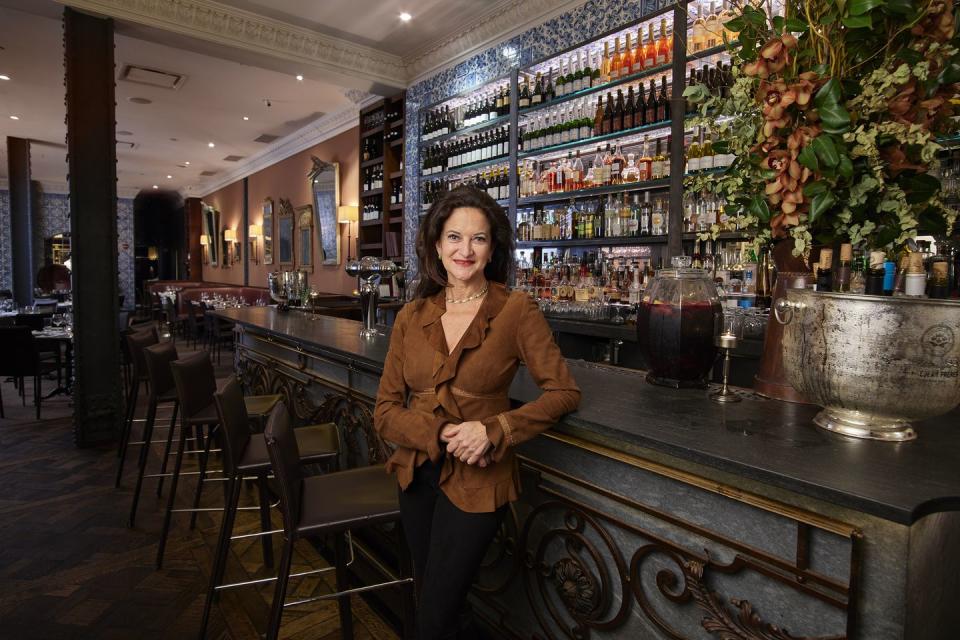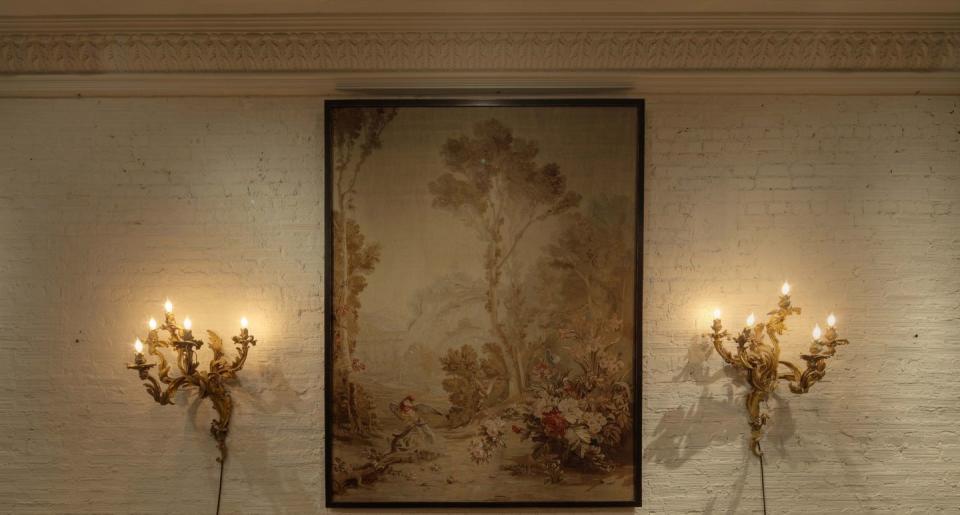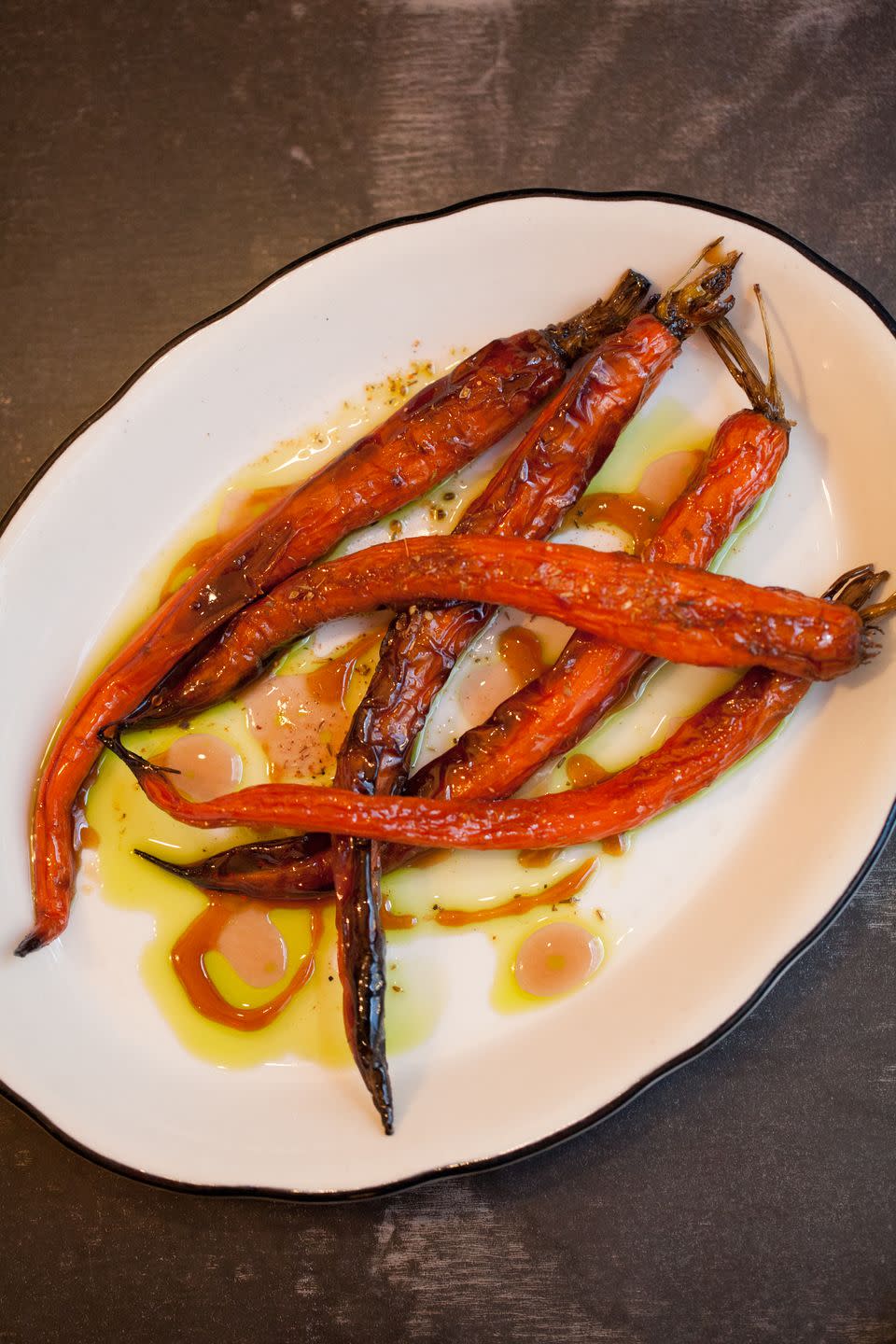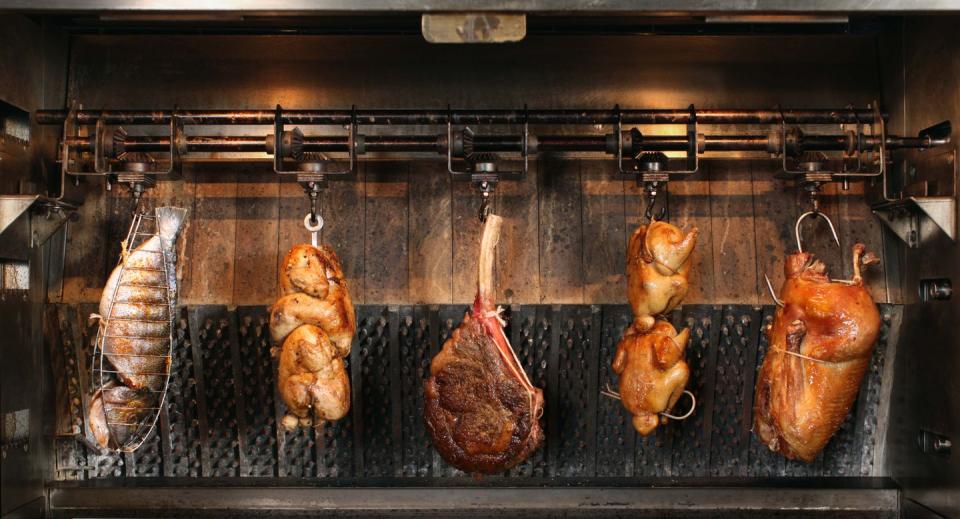Where the Upper East Side Gets Its Rotisserie Chicken

Stepping into the dining room at Rotisserie Georgette in New York's Upper East Side— with its comfortable leather banquettes, lush tapestries, and a bright, robin's-egg tiled wall at the back—is more like visiting a French country estate. And like any provincial home, Rotisserie Georgette serves the very best traditional cuisine: a golden roast chicken, pour deux, with all the fixin's: crisp garden vegetables, indulgent foie gras. You sit back in a curtained booth, drink a 2017 Domaine Jessiaume Burgundy, and for a few hours, you are there, in that country house.
It's easy to see why, in a city with some of the most diverse cuisine in the nation, people go again and again to a restaurant that—while delicious and stylish and sensual— isn't exactly reinventing the wheel.
"It's one of the most traditional kinds of cooking. Roasting on a spit over an open flame, it's almost primal," says Georgette Farkas, founder and general manager. "And every culture has some form of roast chicken. I do think that there's something very universal, something pleasing in the most fundamental, elementary way."

Clearly, her universal recipe is working. Farkas and Rotisserie Georgette have been honored with a “Restaurateur of the Year” (2015) award from the Manhattan Chamber of Commerce, a Wine Spectator “Award of Excellence” (2015) and a Women Chefs & Restaurateurs “Golden Fork Award” (2014) for excellent service.
Before she opened the restaurant in 2013, Farkas spent 17 years as public relations and marketing director for Daniel Boulud. (She had worked with Alain Ducasse at Louis XV in Monte Carlo before that). She got her first restaurant job at 15, as a cook, but she knew entertaining was her calling, not being a chef. The only surprise is that it took her nearly two decades to strike out on her own.
"There's some people who just have risk-taking ability built into their DNA, and I'm not that person," she says. "But there does come a point where somehow emotionally you just don't have a choice. Where if you wake up another day not doing it, you couldn't live with yourself."

A native New Yorker, Farkas spent childhood summers in France. "I was bilingual just by virtue of exposure. Life there almost by definition revolves around good food and good restaurants and dining. So I was exposed to that from a very early age," she says.
After college, she went to the Ecole Hôtelière de Lausanne in Switzerland, working soon at Hôtel de Crillon in Paris, even as a bartender at Blake's Hotel in London. She returned stateside and worked for Boulud's culinary empire beginning in 1995. But she never forgot the style of cooking she first tasted abroad.

"My place is inspired by places we went to as kids in France where literally you walk in and there's a big fireplace and they don't have a menu," she says. "They just ask you, 'Are you going to have a poulet rôti or a côte de boeuf' and they just bring you, salads and crudités and pates to start with. Then they bring you some nice roasted potatoes and for dessert, whatever is the fruit tart of the day. So that is kind of the spirit of what I'm doing here—only in New York you can't just tell people what they're going to eat. You do have to give New Yorkers more choice and more control. "
But delicious cuisine is only half the story to a successful restaurant, Farkas says. There has to be the act of extending an invitation. "When my mother cooked it was sort of a gift to her guests. Everything she made was not only delicious, but also just always looked beautiful. There was always a little bit of theater to it."
Theater, but not fuss. "There will always be a place for the world of traditional, white tablecloth fine dining at the very high end," Farkas says. "But I purposely made this a non-tablecloth restaurant because it was almost a visual cue, a way of telling people, 'Yes, we have some luxury ingredients, but this is really a place you're going to come every day, not a special occasion.' I intended for this place to be an intersection of luxury and simplicity."
The Upper East Side was a natural choice for Farkas to open. "I was born right in this neighborhood. I grew up down on 58th and Sutton place. So I've lived around the world, but I came back."

Farkas is typically in the restaurant seven nights a week (she takes Sunday nights off, but sometimes works brunch.) In the summer, while the rest of the Upper East Side is at the beach, she's in her own kitchen in East Hampton.
"That's where a lot of recipe testing happens," she says.
Right around now, a busy time when everyone is looking for a good roast, she adds special treats to her menu, like black truffles from the south of France.
Rotisserie Georgette is more than enough for Farkas, who has no concrete plans to expand. "I think I've come to a point where I'm just working everyday to make this place the best it can be," she says.

You Might Also Like

